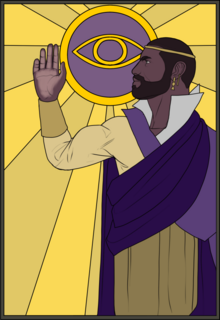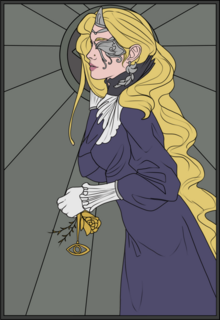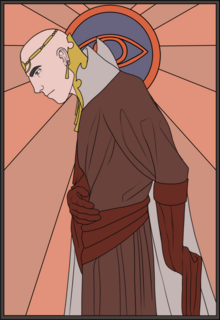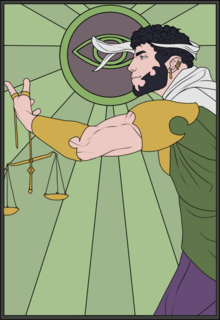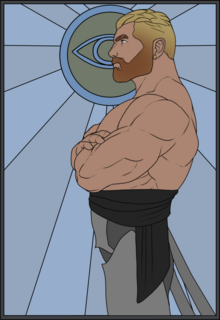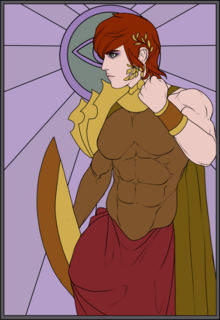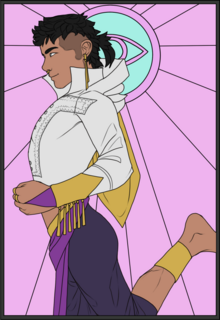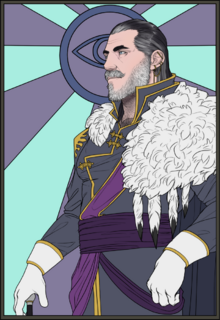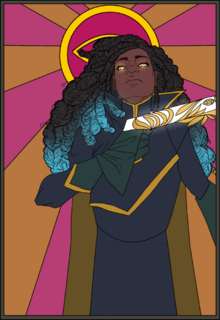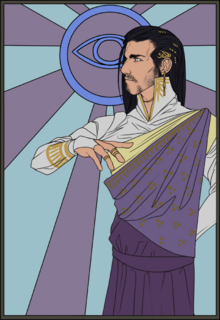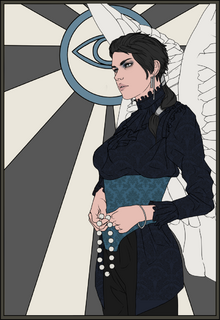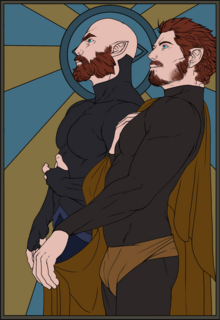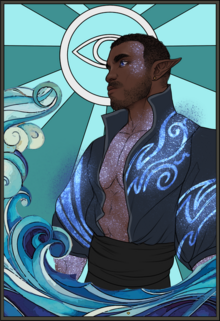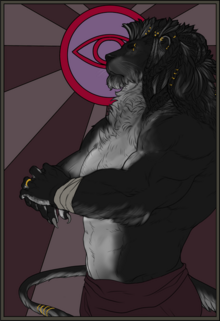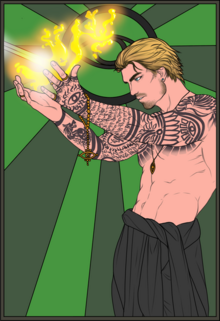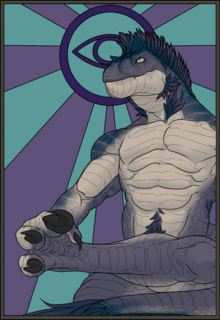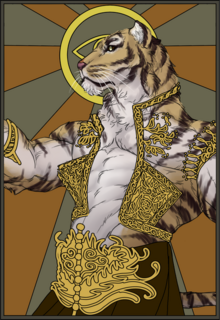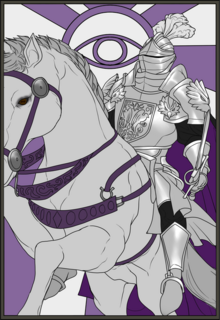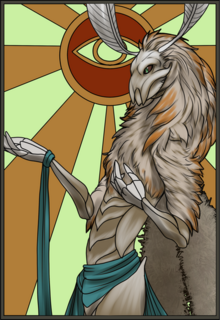More actions
No edit summary |
No edit summary |
||
| Line 69: | Line 69: | ||
* '''The Lesson of Mendes''', is that the Empire brings prosperity, fertility, and wealth to its subjects, and that togetherness and unity are paramount in this. His Lesson preaches the need for unity in the face of foreign issues, and unity in the face of internal fractures, for the faithful to have disagreements and to settle scores, but to always remain aware of the bigger picture of the Great Way above everything, and to root out those who have lost their way and return them. The Vice that Mendes warns of is obviously greed, and how it turns even the kindest of souls into killers and the fondest of relatives into kin slayers for a muse of wealth that will never be sufficient, for the thrift of gold is eternal. | * '''The Lesson of Mendes''', is that the Empire brings prosperity, fertility, and wealth to its subjects, and that togetherness and unity are paramount in this. His Lesson preaches the need for unity in the face of foreign issues, and unity in the face of internal fractures, for the faithful to have disagreements and to settle scores, but to always remain aware of the bigger picture of the Great Way above everything, and to root out those who have lost their way and return them. The Vice that Mendes warns of is obviously greed, and how it turns even the kindest of souls into killers and the fondest of relatives into kin slayers for a muse of wealth that will never be sufficient, for the thrift of gold is eternal. | ||
* '''The Lesson of Ilarion''', is that brotherhood and sisterhood is paramount to the stability of any organization, to have love for one's fellows even in difficult times. His Lesson preaches that family, colleagues, friends, but also fellow Knights and members of Guilds are invaluable, and should be cherished and given special attention and care to. He wishes for strong connections to be built in times of peace and calm, so that rough waters and ruinous weather permits these relations to stand. Ilarion warns against the Vice of treason or selfish disregard, to consider one's betrayal to a vow or oath to be one of the worst taboos a faithful can commit against one's fellows as well as the Gods and Goddesses. | * '''The Lesson of Ilarion''', is that brotherhood and sisterhood is paramount to the stability of any organization, to have love for one's fellows even in difficult times. His Lesson preaches that family, colleagues, friends, but also fellow Knights and members of Guilds are invaluable, and should be cherished and given special attention and care to. He wishes for strong connections to be built in times of peace and calm, so that rough waters and ruinous weather permits these relations to stand. Ilarion warns against the Vice of treason or selfish disregard, to consider one's betrayal to a vow or oath to be one of the worst taboos a faithful can commit against one's fellows as well as the Gods and Goddesses. | ||
* '''The Lesson of Efrat''', is that the house should always be a holy sanctuary of peace and tranquility, and that Temples should always be a holy sanctuary for even the worst of criminals. From her comes the act of "begging for sanctuary", that is to knock on the doors of a Temple or home and plead for mercy, to be protected from harm and prosecution within. While this does not often apply anymore due to the modern implications of State Law, providing safety from harm to outsiders in one's own home is still considered a virtuous act among Unionists. | |||
===Beliefs=== | ===Beliefs=== | ||
* '''Afterlife:''' Unionism has an Afterlife known as the Stairway of the Everwatcher, which is an endless staircase up to the (empty) throne of the Everwatcher which he will ascend to in Paradise. Unionist religion is unique in that it states that once the true virtuous and faithful Empire blessed by the Everwatcher commands all souls on the world (this is called the Great Way), that the Everwatcher will reward service by creating paradise, a world without disease, without suffering and without death. All those who were judged virtuous and entered the Stairway of the Everwatcher will come back to life, and join their descendants and loved ones in eternal bliss. Those that fail the judgement of virtue on the Stairway are instead reincarnated to have another chance at proving themselves for the Great Way. | * '''Afterlife:''' Unionism has an Afterlife known as the Stairway of the Everwatcher, which is an endless staircase up to the (empty) throne of the Everwatcher which he will ascend to in Paradise. Unionist religion is unique in that it states that once the true virtuous and faithful Empire blessed by the Everwatcher commands all souls on the world (this is called the Great Way), that the Everwatcher will reward service by creating paradise, a world without disease, without suffering and without death. All those who were judged virtuous and entered the Stairway of the Everwatcher will come back to life, and join their descendants and loved ones in eternal bliss. Those that fail the judgement of virtue on the Stairway are instead reincarnated to have another chance at proving themselves for the Great Way. | ||
| Line 217: | Line 218: | ||
| | | | ||
Ilarion is the Called God of Knighthood, a very early God to be added to the Pantheon as the Concilly Council verified his god-like combat prowess, but above all his ability to draw supporters from far and wide and inspire great courage, discipline, and camaraderie in them. While never fully proved, it is said that Ilarion was instrumental in helping the early Knight charters with their codes, and binding the first generation loyally to discipline and hierarchy, so that the Knights would all succeed in their purpose. Ilarion has since acted as the supreme independent mediator between all Knight Orders, always wearing white so as not to show preference, and riding on his white steed. Ilarion is also the punisher of supreme betrayal, those who would sell out their Knightly Order or their fellow brothers and sisters in arms to the enemy. Ilarion's Temple is the Grand Temple of Fervent Service, where many Knighthood charters have sacraments of service dedicated to, passing their final exam by standing a 24 hour vigil on the steps of this Temple where Ilarion sits motionless on a simple and humble marble throne, without sleep or food, waiting for the next time the Everwatcher calls him to defend the Honor and Knighthood of the Empire. | Ilarion is the Called God of Knighthood, a very early God to be added to the Pantheon as the Concilly Council verified his god-like combat prowess, but above all his ability to draw supporters from far and wide and inspire great courage, discipline, and camaraderie in them. While never fully proved, it is said that Ilarion was instrumental in helping the early Knight charters with their codes, and binding the first generation loyally to discipline and hierarchy, so that the Knights would all succeed in their purpose. Ilarion has since acted as the supreme independent mediator between all Knight Orders, always wearing white so as not to show preference, and riding on his white steed. Ilarion is also the punisher of supreme betrayal, those who would sell out their Knightly Order or their fellow brothers and sisters in arms to the enemy. Ilarion's Temple is the Grand Temple of Fervent Service, where many Knighthood charters have sacraments of service dedicated to, passing their final exam by standing a 24 hour vigil on the steps of this Temple where Ilarion sits motionless on a simple and humble marble throne, without sleep or food, waiting for the next time the Everwatcher calls him to defend the Honor and Knighthood of the Empire. | ||
|} | |||
</center> | |||
</tr></table> | |||
<table style="width: 100%;"><tr><td style="width: 50%; vertical-align: top; text-align: left;"> | |||
<span style="font-size:150%;><center>'''Efrat, Goddess of Sanctuary'''</center></span> | |||
{| | |||
|[[File:Queenbug.png|220px|thumb|left]] | |||
| | |||
Formally called Queen Efrat bat Batsheba mimishpachat haGilead, Efrat is a living Goddess of Sanctuary and protection of the Home, Temples, and the Imperial Palace. Efrat as a divine entity pre-dates Unionism as a whole, having been alive for 433 years, and ruling the Narim Race for most of that time, also having played a role during the Five Family Rebellion to help the Regalian Empire's founding. Efrat is not worshiped by many, because her role in the pantheon is fairly small, but she bears a much more important role for the Narim as the Mother of the Night Court, a type of highest and most exalted priestess of Narim Unionism. She is confirmed in all other Unionist Schisms as a Goddess for the immense protection and powers she bestows upon the Imperial Family and the Imperial Palace. She is prayed to for protection of Homes from invaders, and protection for Temples against violence and blood spilling. Efrat does not have a formal Temple because she is alive, and administers the Chant of Hashem (the Everwatcher) from the Imperial Palace at midnight, meaning that her very presence is the Temple itself. | |||
|} | |||
</td><td style="vertical-align: top; width: 50%;"> | |||
<span style="font-size:150%;><center></center></span> | |||
{| | |||
| | |||
| | |||
|} | |} | ||
</center> | </center> | ||
Revision as of 22:44, 29 April 2023
| Unionism | |
|---|---|
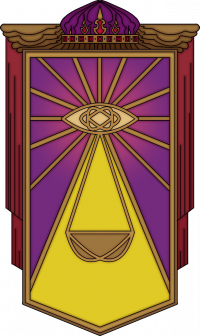 | |
| Religion | |
| Pronunciation | Yoon-yen-is-m |
| Origins | Emperor Theomar |
| Deities | |
| The Everwatcher and various other Gods and Goddesses | |
Abridged Version
Unionism lore is complex, multi-faceted, and nuanced, enough to the point that a single read-through won't clarify everything there is to know about it. Equally, this page is so long that it could scare off new players or people who have trouble absorbing large walls of text. To help out, we provide an abridged version here (in the colored box below). For 9 out of 10 players, this information should be sufficient to understand this important state religion in Regalia, and will get you safely through most roleplays. You are always recommended to look at the pictures of the article itself for inspiration, but reading the rest is optional.
| Unionism | |
|---|---|
| Unionism is an Ailor religion founded by the Prophet-Emperor Theomar, creator of the Regalian Empire. Expanding over time to include many of the Empire's Races, it preaches Regalian hegemony, so that the Emperor of Man can someday become the Emperor of All. Despite two major Schisms, the magic-loving Evintarians and pragmatic Emended, Unionists tend to band together. Unionism recognizes a single benevolent, supreme being called the Everwatcher, which reincarnates in every Regalian Emperor. However, it has expanded over time into a pantheon of subordinate Gods and Goddesses, both from the Empire and its conquered nations. Each deity preaches a Divine Lesson: a way to live one's life, with a vice to avoid. Individual Unionists pick and choose their Gods, but all believe in the Everwatcher.
In summary, the Pantheon includes:
|
Origins
The origins of Unionism are well recorded as it is one of the youngest religions in the world. Unionism was originally founded as an Ailor-only religion by the prophet Emperor Theomar I Ivrae-Kade, of the Regalian Empire following its founding. The prophet spoke about a divine entity called the Everwatcher contacting him in a series of visions, before appearing to him in person, to speak to him about the fate of all living things under the stewardship of the Ailor Race. Emperor Theomar then wrote the holy chronicle called the Creed, which acts like holy scriptures, containing all the religious laws and concepts dear to Unionism. Following the prophet’s death, it was ordained that the Everwatcher would select Emperors of Regalia as its Vessel through which it would speak and guide destiny. Each successive Emperor has made small and large changes to Unionist doctrine by editing parts of the Creed, meaning this holy scripture ended up being a document that evolved as time passed. The Religion has gone through various phases referred to as "ascendancy", "revisionism", and "advancing". The first of which defined a period up to the Regalian Pessimism when all Races were welcome, but the faith was very strictly enforced. The Revisionist era ran concurrent with the pessimism up until the Ranger Crisis, when ultra nationalists attempted to revise the interpretation of Creed and civil governance to make Unionism more Ailor-ethnic-centric and push down on other religions even harder. The Advancing era starting roughly with the rule of Emperor Alexander I is hallmarked by a return to the racial inclusion of the Ascendancy era, while also loosening the repressive enforcement of the Revisionism era, creating even an interpretation of Unionism that was more palatable to non-believers to support. Unionism is fairly unique in comparison to other religions, in that it suffered several schisms, major events of theological conflict between its worshipers that resulted in the community splitting each time. As such, there are 4 distinct Unionist beliefs now: Dogmatic, Evintarian, Emended and Vultragon. Each of these have their own structures, beliefs, and hierarchy, though all invariably worship the Everwatcher, and work towards a common goal, of Regalian hegemony and rule over all the world and its people and for the Emperor of Man to become the Emperor of All.
Schisms
Evintarian Schism
The Evintarian Schism occured directly after the death of the prophet Theomar, when the Concilly Council convened to discuss the matter of the succession. Several Concilly members had dabbled into Magic already, and more of them were of the opinion that Magic could be used to advance Humanity by using it. The hardliner Dogmatic Councillors however felt that Theomar’s preaching on the purity of the soul proved that Magic was a corruption that should be guarded against. The Schism occured when the hardliners broke off the Conclave and started hunting down Magic-users, turning the Empire distinctly anti-Occult. The Evintarian (named after their preacher Horopados Evinter), fled to Etosil and seceded from the Empire. They were later re-integrated into the Empire, but remain religiously separate. And have developed a more pro-Occult and evolution-oriented view of Unionism called Evintarian Unionism. There remains a lot of bad blood between the Evintarian and Dogmatic Unionists because of the religious violence between the two over the centuries.
Emended Schism
The Emended Schism has a somewhat more staggered appearance, in that it did not come about in just a single schism. Originally, Emended Unionism was split between Dogartan Unionism and Vultragon Unionism. Dogartan Unionism was a very small schism of Anglian preachers who rejected the wealth of the Evintarian and Unionist Councils, espousing the virtues of asceticism and poverty. Vultragon Unionism on the other hand was triggered by commoner resentment against the aristocracy and the ruling classes abusing their power, embracing critical thinking as they questioned authority. In recent years, the Dogartan Celates developed new theological arguments heavily rejecting Ivrae-Sange legitimacy and establishing the Emended Divine Beings as their true version of Canon, claiming that the Ivrae dynasty was so incompetent that by their incompetence, they admitted to being usurpers of the true Vessels. This message was well-received by the Vultragons, leading to both communities to merge into the Emended Schism. Because of its inherently critical nature and belief that alexander is not the correct Emperor, Emended Unionism is not well liked by the other religious schisms of Unionism.
Core Identity
Unionism is a Polytheistic religion with a single superior divine being, who is intangible and provides only spiritual guidance, while the Gods and Goddesses interact with the faithful and apply their divine will and power on the world. This intangible supreme being called the Everwatcher reincarnates in every Regalian Emperor (passing through females, but never permitting them to inherit) when they pass on to guide the mortals through the Emperor's words. Unionism has tenets, but as opposed to a clear set of vices and virtues, Unionism's Tenets are the 18 Divine Lessons (which increase as new Gods are added over time). Unionism is unique when compared to other Religions as it did not start out with a Pantheon save for the Everwatcher, the supreme being, and Theomar the Prophet. It expands as time passes, as new Gods and Goddesses are discovered, or Gods from other conquered religions are added. This makes Unionism the only true Syncretic religion in the world, which generally promotes stability and cultural exchange in the Empire. Each God and Goddess represents a Divine Lesson, which is a guideline to live one's life by, but also a vice to avoid.
- The Lesson of Theomar, is devotion and faith in Unionism itself, that life is a test, and that life itself will not be made easy. His Lesson concerns the constant struggle that the highest noble and the lowest peasant will constantly face to test the virtue of their Soul for the Great Way. The Vice that Theomar warns against is lack of faith, or doubt in spirituality, as well as not to be swayed by the foul words of those who wish to sway true believers from the faith as they corrupt souls.
- The Lesson of Ness, is showing kindness, forgiving, and compassion to others, even those who are bereft of humanity in their soul. Her Lesson concerns the forgiveness of criminals, and above all that no soul no matter how tainted is undeserving of mercy or some kindness in their final moments. The Vice that Ness warns against is wroth and cruelty, in that these qualities only breed fear, and will be returned to the one inflicting them twice fold.
- The Lesson of Juvin, is that knowing is half the battle, and that the faithful should always keep learning to better themselves. His Lesson concerns the need for the faithful to aid in the collective archive of knowledge and the well of wisdom, by seeking out information, recording it, and making it widely available to better all. The Vice that Juvin warns against is that false information and evil wisdom can cause a decay in belief that can topple kingdoms.
- The Lesson of Almar, is that law and order are necessary components of a stable society and the enduring of peace and justice. His Lesson concerns the need for the faithful to abide by the rules and laws of the land and to deal onto others what they would have dealt onto them. He asks that even though Laws can sometimes be flawed or slow to react, they should be followed. He warns against the Vice of tyranny, and to pay close attention to the first violators of this principle, the aristocracy.
- The Lesson of Allest, is that to neglect the body is to waste the gift that the Everwatcher has given in life, and to fail the Great Way. His Lesson concerns the need for the faithful to take care of their body and not let it waste away to nothingness, for the physical inability to act for the Great Way is a personal failing. His warned Vice is sloth, and how inaction makes one's life crumble around them.
- The Lesson of Elia, is that war is a necessary evil, a place of much slaughter and grief, but also immaculate beauty and the birth of a better world. Her Lesson is that so long as paradise has not yet come, that war is a necessity, and that souls and hearts need to be steeled for battle. The Vice that she warns against is bloodlust and adulation of horrors, that a person's soul can become blackened by their desire to inflict pain and death on others.
- The Lesson of Vess, is that personal liberties are too quickly taken for granted and lost, with few willing to fight to preserve them. Their Lesson is that freedom is one of the most precious gifts the Empire gives its subjects, and that it should never be taken for granted. The Vice he wants against is the indifference of the suffering of others, proclaiming that if other suffering groups are eliminated, none will stand to defend the beholder when they suffer.
- The Lesson of Alexander, is that power is only temporary and that all forms of eminence and pride should be humbled in the face of the inevitable fall. This lesson is less so from Alexander, and more-so from the fact that when he dies, his name will enter a list of Emperors who leave few memories behind, replaced by yet another Vessel who will bear the title of God of the Vessel, in a continuing cycle not to become attached to reputation or status for it will all be lost one day.
- The Lesson of Taal, is that ignorance and complacency to the encroachment of evil, is an even greater evil that one must remain constantly vigilant of. Taal's Lesson strictly directs itself against the Occult, that reality around the faithful is made by the Everwatcher, and that active use of Occult powers to dislodge that reality is an affront to the beauty of creation itself. The Vice she warns of is blind hatred, that even in actions of vengeance and execution, one must remain pure of heart and sound of reason.
- The Lesson of Nicholas, is that deference and respect to one's betters and rulers is not a sign of weakness but a sign of humble conscience. His Lesson claims the need for a social hierarchy to exist, for the world is divided between those who follow and those who lead, and those who follow can best be manifested and efficiently contribute to the Great Way when led. The Vice he warns of is insolence and disrespect, in that they breed a worse habit of irreverence and callousness that will ruin anyone.
- The Lesson of Elen, is that Magic is both an immaculate gift and a terrible mission placed on the individual to live as a paragon of virtue. Her Lesson contradicts Taal in that being able to be Occult (not including Afflictions) is in itself a decision made by the Everwatcher, but that this is evidence of a greater burden placed on the individual to reach greater heights of value for the Great Way, and to be chosen with guilt. The Vice she warns of is pride and judgement over things one has no understanding of.
- The Lesson of Niall & Nolan, is that Art should never be forgotten in lust for power or war and that culture can kill empires as well as armies. Niall and Nolan's Lesson is entirely centered around the idea of a universal believer, who must both be able to appreciate the military and the cultural aspects of the world to be a whole person. They specifically preach for the faithful to apply moderation in everything they do and live balanced lives. They warn against the Vice of over-indulgence of anything, whether that be war or art or food, preaching that addiction breeds a need, and that need breeds a market for anyone to start inserting ill will and foul deeds into the hands of someone who is unable to resist.
- The Lesson of Ceren, is that the world is a fickle and dangerous place and that ignorance of the power of nature is sure to bring ruin if respect is not given. Ceren teaches the faithful that while the world if beautiful in its creation by the Everwatcher, that it is also filled with monsters, horrors, and disasters that can end a wandering soul at any moment. He preaches for the need for deference and respect for the world, and to always retain a sense of wonder for the miracles found away from one's bed. The Vice he warns against is that of indifference and apathy, to be so foolishly blind to the splendor of creation and the world so as to become a boring and uncreative person who might as well be machine.
- The Lesson of Hor, is that serving even a lowly baron or aristocrat as servant or guard, is just as devout as being the Imperial Guard of the Emperor. Hor's Lesson is that helping anyone else, whether that be serving them a drink or handing them the book they were looking for, is just as devout and meaningful to the Great Way as slaying a Demon fiend, or saving the Emperor from evil. Hor's Lesson preaches to find pride in little acts, and to not fetishize humility to the point of disregarding the meaning of small kindnesses showcased during the day. The Vice Hor warns of is over-ambition, and the burning of bridges and people on the way to power and the top, which always leave a soul less fulfilled when the summit is reached alone.
- The Lesson of Kristoph, is that personal desires always come at the expense of others and that actions must be measured in the effects they have on others. His Lesson concerns going on auto-pilot each day and not paying attention to the butterfly-effect of actions and decisions being taken having potentially disastrous effects for others down the line. His Lesson tells the faithful always to be sympathetic and try to be empathetic with others, and to consider the weight of a decision proportional to the affect it will have on others. The Vice he warns against is indecision, and the inability to decide on matters that require speedy resolution. He generally warns against tardy action, or sluggish reaction to problems that arise in the Empire.
- The Lesson of Agus, is that a soul is perpetually wandering and that a life is never fulfilled, even if destiny is found temporarily, only to be replaced with new ventures. His Lesson states that no life will ever reach a point of fulfillment before the final judgement of the Everwatcher is rendered after death. Even an old man on his deathbed can still contribute to the Great Way by donating his inheritance to charity and dispensing final wisdoms to his descendants. In that, Agus also warns against the Vice of living alone or choosing to go through life solitary or celibate (though exceptions are made for priests and Knights). He warns that if one's life is not passed on to others, that it will be forgotten, and perhaps had no meaning at all.
- The Lesson of Mendes, is that the Empire brings prosperity, fertility, and wealth to its subjects, and that togetherness and unity are paramount in this. His Lesson preaches the need for unity in the face of foreign issues, and unity in the face of internal fractures, for the faithful to have disagreements and to settle scores, but to always remain aware of the bigger picture of the Great Way above everything, and to root out those who have lost their way and return them. The Vice that Mendes warns of is obviously greed, and how it turns even the kindest of souls into killers and the fondest of relatives into kin slayers for a muse of wealth that will never be sufficient, for the thrift of gold is eternal.
- The Lesson of Ilarion, is that brotherhood and sisterhood is paramount to the stability of any organization, to have love for one's fellows even in difficult times. His Lesson preaches that family, colleagues, friends, but also fellow Knights and members of Guilds are invaluable, and should be cherished and given special attention and care to. He wishes for strong connections to be built in times of peace and calm, so that rough waters and ruinous weather permits these relations to stand. Ilarion warns against the Vice of treason or selfish disregard, to consider one's betrayal to a vow or oath to be one of the worst taboos a faithful can commit against one's fellows as well as the Gods and Goddesses.
- The Lesson of Efrat, is that the house should always be a holy sanctuary of peace and tranquility, and that Temples should always be a holy sanctuary for even the worst of criminals. From her comes the act of "begging for sanctuary", that is to knock on the doors of a Temple or home and plead for mercy, to be protected from harm and prosecution within. While this does not often apply anymore due to the modern implications of State Law, providing safety from harm to outsiders in one's own home is still considered a virtuous act among Unionists.
Beliefs
- Afterlife: Unionism has an Afterlife known as the Stairway of the Everwatcher, which is an endless staircase up to the (empty) throne of the Everwatcher which he will ascend to in Paradise. Unionist religion is unique in that it states that once the true virtuous and faithful Empire blessed by the Everwatcher commands all souls on the world (this is called the Great Way), that the Everwatcher will reward service by creating paradise, a world without disease, without suffering and without death. All those who were judged virtuous and entered the Stairway of the Everwatcher will come back to life, and join their descendants and loved ones in eternal bliss. Those that fail the judgement of virtue on the Stairway are instead reincarnated to have another chance at proving themselves for the Great Way.
- Canon Evil: Canon evil is somewhat dubious, and exists on multiple levels. The most obvious evil in Unionism is called the Sin of Creation. The Sin of Creation implies that all living beings were born with inherent flaws to overcome to prove their worthiness for the cause of the Great Way. As such, evil is done simply because people do not have self control or inhibitions. The next stage of evil are Spirits. Unionism acknowledges all entities coming from different dimensions save the (Alorian) afterlife as Spirits seeking to corrupt the minds and wills of the living. These beings infest or seduce the living into giving into their Sin of Creation. The third level of evil is somewhat more ambiguous, as it is other religions. While Unionism doesn’t strictly deny the existence or validity of other religions, it does claim that by worshiping anyone but the Everwatcher, that the living are led astray from creating Paradise, and that they live in sabotage of the Great Way’s conclusion. Essentially, other religions are seen as a distracting evil.
- Conversion: Unionism is a religion that has invariably been applied with the sword, or without word, and both interpretations are somewhat correct. Unionists believe that a person, even one who is not Unionist or pretends to be Unionist, can still work towards the Great Way if pointed in the right direction by the faithful. This is why the Confessions of Melennar are important, because this preacher created a common understanding that as a Regalian Unionist ruler, one’s non-Unionist subjects can still work towards the Empire’s cause, while not believing in the Everwatcher, and their soul can still ascend to the Unionist afterlife if their own religion or a-religiosity will not claim them. As such, conversion by the sword is also fully acceptable, because it forcibly induces someone into the Great Way, though it has become more controversial and less acceptable as of late.
Gods and Goddesses
Unionism has 18 Gods and Goddesses (Vess is non-binary, but old faith dogma does not acknowledge a non-binary term for God). Some of these are Vessel Gods (meaning they once held the Everwatcher's soul in them), Called Gods (meaning the Concilly Council held in conclave that they were mortals who ascended to Godhood through a higher calling), and Joined Gods (meaning the Concilly Council included them in the faith as they used to belong to a conquered people). It is expected that Unionism grows as it controls more land, as some gods from conquered regions are added.
|
|
|
|
|
|
|
|
|
|
|
|
|
|
|
|
|
|
Priestly Activities
Dogmatic Unionist priests are part of the so-called Dogmatic Religious Community. At the very top is the Concilly Council. Originally this organization had a leader called the Supreme Reverend, however the Supreme Reverend position was abolished when the last Supreme Reverend discovered insidious corruption within the religious community, tried to expose it, and was assassinated for it. To compensate, Conclave determined that the Dogmatic community should henceforth be ruled by a Council of elder Arch-Celates. Below the Concilly Council, are the Arch-Celates, which are equivalents to Dukes in the Regalian Empire. They wield considerable power and rule over vast areas of land, subdivided into Celeries. Below the Arch-Celate is the Celate, or just the average priest. Each Celate administrates a Celerie, which is usually a piece of land donated to the clergy where they maintain temples, shrines, and convents, while also producing crops and tending to cattle. Celates perform all religious tasks such as confession, preaching, hearing concerns, and simply taking care of Unionist needs like a social caretaker or mental health worker. Arch-Celates on the other hand are more administrative in that they take care of the treasury, any military attached to the religious orders, and communication between the Concilly Council and the vast wide-spread Unionist elements. Formally the Emperor is the leader of the Holy Seat, which is more of a group term for the Palace and the Concilly Council grouped together, but historically Emperors have interfered very little in the day to day running of the Celeries, and as such, this fact is usually ignored, the Emperor being considered a completely independent entity. This has also historically separated the Emperor from controversy among the Celates, and vice versa.
The Nuance of Godly Tribalism
For those who have lasted long enough to read to this point, it should have become obvious that not all Gods and Goddesses see eye to eye, and that some of them even directly contradict each other. While the Creed theoretically exists to apply the correct interpretation and lessons to be learned from the Gods and Goddesses, reality often finds for example Elen and Taal followers at odds, and Elia and Niall & Nolan followers at odds because of ideological differences. Unionism does not demand the universal worship of every God and Goddess, often the faithful only pick a few that really apply to them, after all, why would an Anglian peasant worship the God of King and Emperors if only in passing to praise his name for the Creed and Prophecy. No God or Goddess is also more or less correct than another, in the eyes of the Everwatcher, each God has some degree of validity, and some degree of error which is prone in the Sin of Creation, both in the fact that even Gods and Goddesses can sometimes act in error, but also in that mortals can apply the wrong interpretation of their lessons to reality around them. It is important never to call another Character a heretic for preferring one God or Goddess over the other and disregarding the preaching of one to uphold those of another.
Trivia
- Unionism used to be mandatory for nobility somewhere during the second century after Cataclysm, though this Holy Law was removed when the war against the Skagger Horde ceased, and the Empire benefited more from including non-Unionists into the peerage. An exception had always been made for the Altalar nobles of Solvaan origins in Solleria however, called the Confessions of Melennar.
- Sectarian violence largely came to an end at the turn into the fourth century as the last attacks on Vultragon Unionist by state forces ceased, and an uneasy truce was signed between the Schism religious communities. They still do not see eye-to-eye, and the different Schismatic groups still prod at each other, but instead of murdering each other over sectarian differences, they mostly fight with words nowadays, a legacy of the Kleine Rechnung, the document that called for the truce.
- Despite Elen's absorption into Unionism, the Breizh still maintained a high level of cultural autonomy, some even clinging to old beliefs. As such, even when Magic became illegal in the Empire, the Breizh Aelrrigan Order continued to find and train Mages safely in their sanctuaries while the rest of the Empire turned to brutal oppression (and the Magic part of Elen was suppressed from dogma). Elen's faithful among the Aelrrigan Order are commonly cited as the reason why Magic acceptance eventually returned, and Elen's magical nature in theological teachings was returned.
| ||||||||||
| Accreditation | |||||||
|---|---|---|---|---|---|---|---|
|
| ||||||
